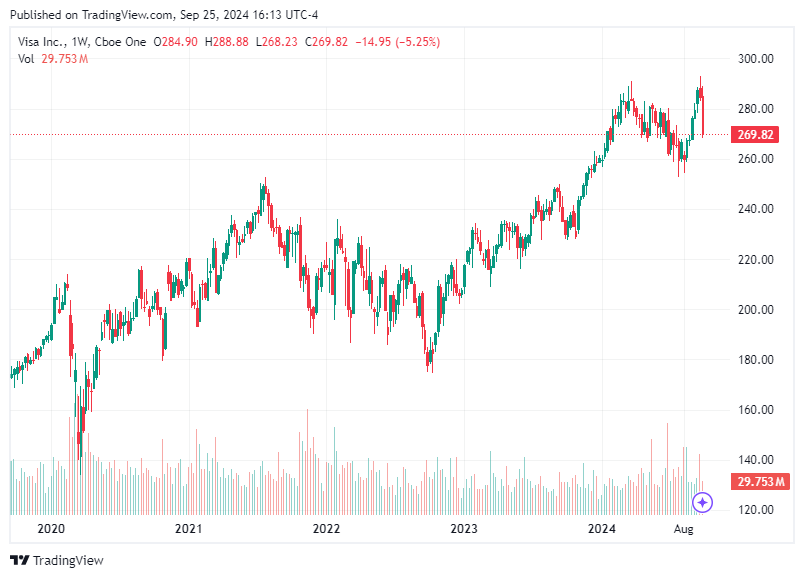Nancy Pelosi's Husband Sold Over $500,000 Worth of Visa Stock Three Months Before Antitrust Charges
Paul Pelosi's Timely Visa Stock Sale Raises Eyebrows Amid DOJ Lawsuit.

Disclaimer: This article is intended for informational purposes only and does not constitute promotional or commercial content.
The recent sale of Visa stock by Paul Pelosi, the husband of former House Speaker Nancy Pelosi, has drawn attention and sparked extensive debate. This financial transaction, involving over $500,000 worth of stock, occurred just three months before the Department of Justice (DOJ) filed antitrust charges against Visa. The timing of the sale and the subsequent legal action against Visa, which accuses the company of monopolizing the debit card market, have led to speculation about potential insider information. While Nancy Pelosi's spokesperson has denied any involvement on her part, the situation has revived discussions about the appropriateness of stock trading by lawmakers and their families.
The Timeline of Events
In the realm of finance and politics, timing can be crucial. Paul Pelosi's decision to sell a substantial amount of Visa stock was made in the months leading up to the DOJ's announcement of a lawsuit against Visa. This lawsuit, filed on September 24, accuses Visa of engaging in anticompetitive practices to maintain its control in the debit card market. The DOJ's case is the result of an extensive review by its antitrust division, focusing on how Visa's practices may have hindered competition and innovation.
The sale of Visa stock by Pelosi has been documented in public financial disclosures, shedding light on the transaction that predates the legal action. Despite the lack of prior public warning about the DOJ's intentions, the close proximity in timing has led to questions about whether non-public information may have influenced the decision to sell. The DOJ's lawsuit against Visa is part of a broader effort to address antitrust concerns in various industries, particularly in the tech and financial sectors. The allegations against Visa center around its control over the debit card market, which the DOJ claims has been maintained through practices that limit competition. Such practices could include restrictive agreements with merchants and policies that deter the use of alternative payment networks.
Antitrust lawsuits like this one are aimed at ensuring a competitive marketplace where innovation can thrive, and consumers have choices. If the DOJ's claims are upheld, Visa could face substantial penalties and be required to alter its business practices to foster a more competitive environment.
Lawmakers and Stock Trading
The controversy surrounding Paul Pelosi's stock sale also touches on a recurring theme in American politics: the ethical considerations of stock trading by lawmakers and their families. While members of Congress are allowed to trade stocks, there are rules intended to prevent conflicts of interest, particularly when it comes to using non-public information for personal gain.
The STOCK Act, passed in 2012, was designed to combat insider trading by government officials. It requires lawmakers to report stock trades within 45 days and emphasizes transparency. However, the act does not outright prohibit trading, leading to ongoing debates about whether additional measures are necessary. Critics argue that the potential for conflicts of interest is inherent in allowing lawmakers and their families to engage in stock trading, especially when legislative decisions can impact market conditions. Calls for stricter regulations or even a complete ban on such activities have been proposed as a means to restore public trust.
The situation with Paul Pelosi's Visa stock sale highlights the challenges of public perception and the ethical considerations associated with financial transactions by those in the political sphere. Even without concrete evidence of wrongdoing, the mere suggestion of impropriety can be damaging. Public confidence in elected officials relies heavily on the perception of integrity and the assurance that decisions are made in the public's best interest, free from personal financial considerations. For lawmakers, maintaining this trust is crucial, as their decisions and actions are scrutinized not only for their immediate impact but also for their alignment with ethical standards. The narrative surrounding Paul Pelosi's stock sale emphasizes the need for robust mechanisms that ensure transparency and accountability.
Potential Reforms and Future Outlook
In response to ongoing controversies like the one involving Paul Pelosi, there have been calls for stronger measures to regulate stock trading by lawmakers and their families. Proposed reforms include mandatory blind trusts for elected officials, stricter disclosure requirements, or outright bans on trading stocks of companies that could be affected by legislative actions.
Such reforms aim to eliminate the potential for conflicts of interest and enhance public trust in government institutions. While implementing these changes poses challenges, including legal and logistical considerations, the ongoing public discourse suggests a growing appetite for reform.
The case of Paul Pelosi's timely Visa stock sale serves as a focal point for broader discussions about the intersection of politics, finance, and ethics. As the DOJ's lawsuit against Visa unfolds, it will be closely monitored not only for its impact on the financial industry but also for what it reveals about the need for ongoing vigilance and potential reforms in how lawmakers and their families engage in stock trading. The outcome of these discussions could shape future policies aimed at ensuring transparency, fairness, and integrity within the corridors of power.
Disclaimer: This article is intended for informational purposes only and does not constitute promotional or commercial content.
We are working endlessly to provide free insights on the stock market every day, and greatly appreciate those who are paid members supporting the development of the Stock Region mobile application. Stock Region offers daily stock and option signals, watchlists, earnings reports, technical and fundamental analysis reports, virtual meetings, learning opportunities, analyst upgrades and downgrades, catalyst reports, in-person events, and access to our private network of investors for paid members as an addition to being an early investor in Stock Region. We recommend all readers to urgently activate their membership before reaching full member capacity (500) to be eligible for the upcoming revenue distribution program. Memberships now available at https://stockregion.net


